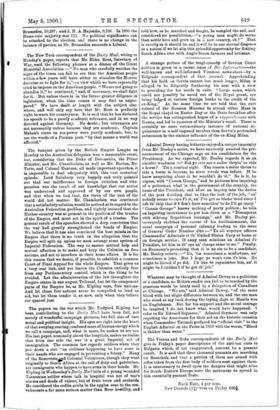The banquet given by the British Empire League on Monday
to the Australian delegates was a memorable event, but, considering that the Duke of Devonshire, the Prime Minister, and Mr. Chamberlain, as well as Mr. Barton, Mr- Tarte, and Colonel Denison, all made important speeches, it is impossible to deal adequately with this vast oratorical episode. Lord Salisbury very happily and truly pointed out that our indifference to foreign criticism and vitu- peration was the result of our knowledge that our action was understood and approved of by our own people, and that when we had that, the views of the rest of the world did not matter. Mr. Chamberlain was convinced that a satisfactory solution would be arrived at in regard to the Australian Federation problem, and rightly insisted that the Mother-country was at present in the position of the trustee of the Empire, and must act in the spirit of a trustee. The general result of the speeches showed a deep conviction that the war had greatly strengthened the bonds of Empire. We believe that it has also convinced the best minds in the Empire that there is no truth in the allegation that the Empire will split up unless we soon arrange some system of Imperial Federation. The way to ensure mutual help and mutual affection is to make and keep the Colonies as free nations, and not to interfere in their home affairs. It is for this reason that we desire, if possible, to establish a common Court of Final Appeal for the whole Empire. That gives us a very real link, and yet leaves the Colonies entirely free from any Parliamentary control, which is the thing to be avoided. Let the administration of the law throughout the Empire centre in one august Tribunal, but let the component parts of the Empire be, as Mr. Kipling says, free nations. And let those free nations never be compelled to lend us aid, but let them tender it, as now, only when they believe our quarrel just.






































 Previous page
Previous page